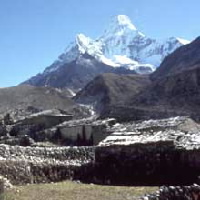Teresa Peña
Byrd Middle School
Exploratory ID Unit
HOME
Climb the Himalayas

Himalaya is a Sanskrit word meaning, "snow abode"
GOAL - To understand basic health/physical requirements for high altitude climbing and to learn first aid safety skills.
OBJECTIVES - Students will train and keep a month long walking log. They will also complete CPR training and learn first aid skills. Finally, students will prepare a safety manual for high altitude climbing and trekking.
REFLECTION QUESTIONS - What physical or mental differences have you felt in extreme weather conditions? In what way is teamwork important in daily situations? How do you think you would feel physically on top of Mt. Everest?
P.E. teachers can find many lessons about teamwork, first aid skills and physical training for climbing and trekking in high altitudes. The links below offer ideas which can be incorporated into a health class or into an aerobic study.
The Himalayan Mountain range stretches from India, Nepal, Bhutan, and Tibet. It has 10 of the highest peaks in the world. The Himalayas measures from sea level up to 29,035 feet. On a map the mountain range lies at 86º55'40" E Longitude to 27º59'16" N, Latitude.
Mount Everest is just one of over 30 peaks in the Himalayas that are over 24,000 feet high. It is always covered with snow and ice.
There are four climatic zones in mountainous
region around Mount Everest. A climber can find a forested area near the
base, higher up an alpine zone, above that the upper alpine zone where
only moss can grown and near the top the Arctic zone where nothing can
grows.
The links contain information about physical preparation for climbing, medical safety, required gear used for climbing and a history of Everest.

The physiology of high altitude climbing
This site was created byTeresa Peña at the NEH Summer Institute "Cultures and Religions of the Himalayan Region," held at the College of the Holy Cross, Summer 2004